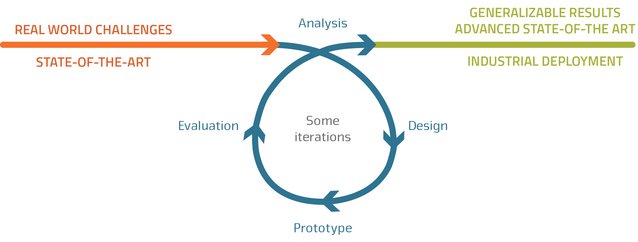All our collaborative activities are based on a mixture of research frontier knowledge and challenges faced by the industry. Collaboration is based on having a close connection between theories and methods developed and used at Department of Computer Science and the reality and practical solutions that are the aim of the collaboration. Projects typically follow an experimental iterative approach resulting in proof-of-concept demonstrations, industrial strength prototypes, concrete analysis and methods, as well as research publications in premier venues.
The figure below illustrates a typical experimental industry oriented project life cycle.

At Department of Computer Science we emphasize multidisciplinary attitudes to research. We do not draw lines between the various strands of subjects and there is a lively interaction between all research areas. Problem-oriented and inter-disciplinary approaches characterize our research. It is our goal to maintain our position as one of the top research centres in Europe within both theoretical and experimental computer science.
MADE – Platform for Future Production is an academic-industry collaboration which will pave the way for the development of new, efficient and enhanced types of production capable of making production in Denmark more competitive and attractive to companies and society at large. The platform will contribute to innovative, holistic, cross-functional and interdisciplinary solutions by leveraging new technologies, organizational forms, structures, and work systems.
Funded by: MADE is a SPIR project, funded by the Danish Council for Technology and Innovation.
EcoSense - Collective Sensing and Macroscopic Analysis Methods for Reducing Company- and Society-level Environmental Footprints
The objective of EcoSense is to develop novel collective sensing, macroscopic analysis and visualization methods for streams of semantically annotated (e.g. with location) measurement data from which climate impacts can be inferred.
Funded by: The EcoSense project is funded by the Danish Council for Strategic Research.
Project with COWI and SCALGO on algorithms and software for efficient screening of flood risk from water collection in depressions and rising in rivers, as well as efficient update of such analysis when terrain data is chanced. Project e.g. led to very successful product Scalgo Live.
Funded by: Innovation Fund Denmark (formerly known as "Højteknologifonden")
Project on how massive amounts of detailed terrain data can be handled efficiently. Project partners included COWI (as data producer) and biology/environmental researchers (as data users). Project lead to efficient software for terrain model construction and simplification and for fundamental surface flow analyses. Results eventually lead to the start-up company SCALGO.
Funded by: The Danish Council for Strategic Research
The eGov+ project was a collaboration between Department of Computer Science and three Danish municipalities (Aarhus, Aalborg and Ringkøbing-Skjern), Aalborg University, the Alexandra Institute, KMD, Logica and Scanjour.
Aim: Better public service through new use of IT research and technologies to create IT based collaboration between citizens and the public sector.
Duration: 2008 -2011.
Funded by: The Danish Council for Strategic Research
In the Connect2Care project several health IT companies cooperated on a proposal for an open technical infrastructure for social and health services based on international standards. A special focus was on software ecosystems. The results were used in the Net4Care project. The national reference architecture for collecting health data published a year later, in 2013, was close to identical to the proposal of Connet2Care.
The participating companies were: IBM Danmark, Intel Sweden AB, KMD, Sekoia, Silverbullet and TDC.
Funded by: Ministry of Higher Education and Science
Following the publishing of the national reference architecture, Department of Computer Science and the Alexandra Institute got funding for a project that should demonstrate in practice that health data could indeed be exchanged between welfare tech solution in the home and electronic patient records using the infrastructure from Connect2Care and the tools from Net4Care. This was successfully demonstrated together with Sekoia and Systematic.
Funded by: Ministry of Higher Education and Science
Project with DSE airport solutions (now Insero) on algorithms and systems for air traffic management and analysis. Projects e.g. lead to a product used to analyze flight tracks around airports for traffic optimization purposes.
Funded by: DSE Airport Solutions (now Insero) and Innovation Fund Denmark (formerly known as "Højteknologifonden")
The aim of DABAI is to make Denmark a pioneer in exploiting the full potential of big data. In order to do this, DABAI offers a number of possibilities for additional companies and other organisations to exploit the possibilities for making use of data relating to their business. We offer different opportunities for cooperation: